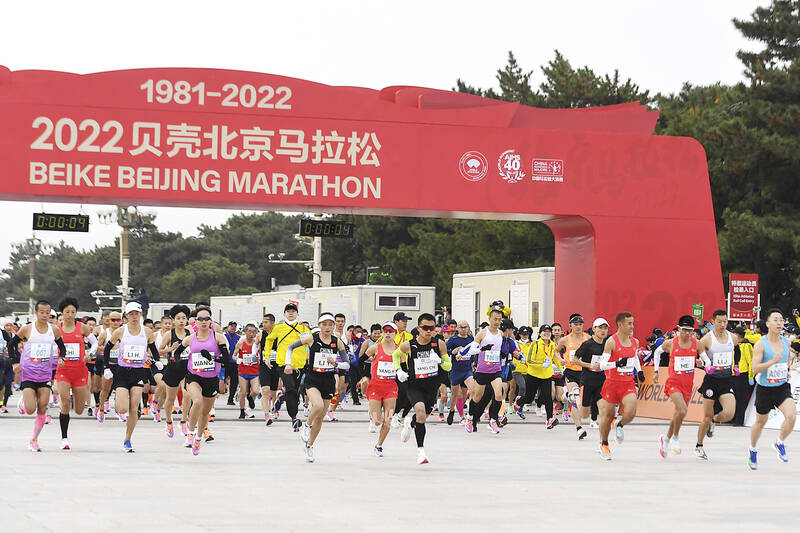China yesterday reported its highest number of new COVID-19 infections in six months, a day after health officials said they were sticking with strict coronavirus curbs, dashing hopes for an easing.
China recorded 4,420 new locally transmitted COVID-19 infections on Saturday, the Chinese National Health Commission said, the most since May 6, and up from 3,659 new local cases a day earlier.
Although case numbers are extremely low by global standards, China has stuck with a “zero COVID-19” approach for almost three, involving lockdowns, quarantines, frequent testing and a drastic decrease in inbound travel.

Photo: AP
At a news conference on Saturday, health officials reiterated their commitment to the “dynamic-clearing” approach to COVID-19 cases as soon as they emerge.
China’s anti-COVID-19 measures are “completely correct, as well as the most economical and effective,” disease control official Hu Xiang said. “We should adhere to the principle of putting people and lives first, and the broader strategy of preventing imports from outside and internal rebounds.”
The announcement follows speculation that the country was considering changing its disease containment policy that has disrupted economic growth and daily life.
The death of a three-year-old boy in a quarantined residential compound had fueled growing discontent with the anti-virus controls and triggered rumors of policy shifts.
However, many analysts said they do not expect significant easing to begin until after China’s annual parliamentary session in March.
China’s southern city of Guangzhou continued to report rising infections, with 66 new locally transmitted symptomatic and 1,259 asymptomatic cases, compared with 111 symptomatic and 635 asymptomatic cases a day earlier, city authorities said.
China’s capital, Beijing, reported 43 symptomatic and six asymptomatic cases, compared with 37 symptomatic and five asymptomatic cases the previous day.
The annual Beijing Marathon took place yesterday morning under strict COVID-19 protocols, after being canceled the previous two years.
About 26,000 participants registered for the event that began under smoggy skies in central Beijing’s Tiananmen Square. Runners were required to take PCR tests for the three days leading up to the race and not to leave Beijing for seven days.
It is thought there are about 200 lockdowns across China, with the harshest and longest in highly securitized regions.
Restrictions are also in place in parts of Inner Mongolia and the western Xinjiang region, where 43 new high-risk areas were designated on Saturday, including Urumqi, the regional capital.
Frustrations over the severity of the measures have escalated in Wuhan, where videos show residents damaging public property and shouting “give us freedom.”
Health officials admitted that some areas had been guilty of an unscientific “one-size-fits-all” attitude to lockdowns, singling out the western cities of Nanchong and Bijie.
“We attach great importance to these problems and are rectifying them,” disease control official Tuo Jia said.

South Korea would soon no longer be one of the few countries where Google Maps does not work properly, after its security-conscious government reversed a two-decade stance to approve the export of high-precision map data to overseas servers. The approval was made “on the condition that strict security requirements are met,” the South Korean Ministry of Land, Infrastructure and Transport said. Those conditions include blurring military and other sensitive security-related facilities, as well as restricting longitude and latitude coordinates for South Korean territory on products such as Google Maps and Google Earth, it said. The decision is expected to hurt Naver and Kakao

THE TRAGEDY OF PUNCH: Footage of the seven-month-old Japanese macaque has gone viral online after he was rejected by his mother and formed a bond with a soft toy A baby monkey in Japan has captured hearts around the world after videos of him being bullied by other monkeys and rejected by his mother went viral last week. Punch, a Japanese macaque, was born in July last year at Ichikawa City Zoo. He has drawn international attention after zookeepers gave him a stuffed orangutan toy after he was abandoned by his mother. Without maternal guidance to help him integrate, Punch has turned to the toy for comfort. He has been filmed multiple times being dragged and chased by older Japanese macaques inside the enclosure. Early clips showed him wandering alone with

MONEY GRAB: People were rushing to collect bills scattered on the ground after the plane transporting money crashed, which an official said hindered rescue efforts A cargo plane carrying money on Friday crashed near Bolivia’s capital, damaging about a dozen vehicles on highway, scattering bills on the ground and leaving at least 15 people dead and others injured, an official said. Bolivian Minister of Defense Marcelo Salinas said the Hercules C-130 plane was transporting newly printed Bolivian currency when it “landed and veered off the runway” at an airport in El Alto, a city adjacent to La Paz, before ending up in a nearby field. Firefighters managed to put out the flames that engulfed the aircraft. Fire chief Pavel Tovar said at least 15 people died, but

Australian Prime Minister Anthony Albanese yesterday said he did not take his security for granted, after he was evacuated from his residence for several hours following a bomb threat sent to a Chinese dance group. Albanese was evacuated from his Canberra residence late on Tuesday following the threat, and returned a few hours later after nothing suspicious was found. The bomb scare was among several e-mails threatening Albanese sent to a representative of Shen Yun, a classical Chinese dance troupe banned in China that is due to perform in Australia this month, a spokesperson for the group said in a statement. The e-mail